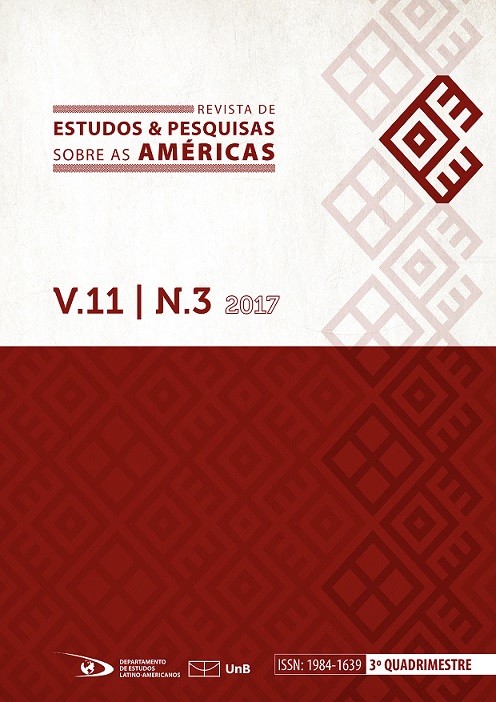Narrando Revoluções com os Pés no Haiti: A Revolução haitiana por Michel-Rolph Trouillot e outros intelectuais caribenhos
Keywords:
Sociologia, Relações étnico-raciais, Estudos Pós-coloniaisAbstract
O objetivo central do presente ensaio é abordar a Revolução de 1791, evento paradigmático da história haitiana, a partir das narrativas produzidas por alguns de seus intelectuais, que evidenciam o país que ali teve seu berço como lugar de enfrentamento e luta contra a escravidão, onde foi gestada e se disseminou a ideia de liberdade e independência para o restante da América colonizada. Justapondo as narrativas desses intelectuais e suas narrativas adversárias, forjadas no âmago do sistema colonial, esboçamos o modo como o Haiti revolucionário eclode como espaço simbólico de resistência contra todas as tentativas dos colonos ”“ naquele momento, quase todos homens brancos - de impor a desumanização de seus colonizados ”“ homens e mulheres negros/as ”“. Parece-nos, ao final, que esse espírito de não submissão, não adaptação e não aceitação da lógica e do modelo de dominação impostos será irremediavelmente associado a um “modo de ser haitiano”, um habitus infame, percebido ora como algo positivo e peculiar do povo haitiano, ora como razão de uma suposta incapacidade de integrar-se ao progresso e ao desenvolvimento. De comum, as narrativas sobre a revolução apontam o Haiti como lugar de denúncia da barbárie imposta por um colonizador surpreendido na aberração de seu discurso civilizatório.
Palavras-chave: revolução haitiana; intelectuais haitianos; Michel Roulph-Trouillot; colonialidade.
Narrating Revolutions With Feet in Haiti: The Haitian Revolution by Michel-Rolph Trouillot and other Caribbean intellectuals
Abstract
The main objective of this essay is to address the Revolution of 1791, a paradigmatic event in Haitian history, based on the narratives produced by some of its intellectuals, which show the country that had its cradle as a place of confrontation and struggle against slavery, where the idea of freedom and independence for the rest of colonized America spread. Juxtaposing the narratives of these intellectuals and their adversarial narratives, forged at the heart of the colonial system, we sketch out how revolutionary Haiti emerges as a symbolic space of resistance against all attempts by settlers - then almost all white men - to impose the dehumanization of their colonized - black men and women -. It seems to us in the end that this spirit of non-submission, non-adaptation and non-acceptance of the logic and model of domination imposed will inevitably be associated with a "Haitian way of being", an infamous habitus, perceived sometimes as something positive and peculiar of the Haitian people, others as the reason for a supposed inability to integrate with progress and development. In common, the narratives about the revolution point to Haiti as a place for denouncing barbarism imposed by a colonizer caught in the aberration of his civilizing discourse.
Keywords: Haitian revolution; Haitian intellectuals; Michel Roulph-Trouillot; coloniality.
Narrando Revoluciones con los Pies en Haití: La Revolución haitiana por Michel-Rolph Trouillot y otros intelectuales caribeños
Resumen
El objetivo central del presente ensayo es abordar la Revolución de 1791, evento paradigmático de la historia haitiana, a partir de las narrativas producidas por algunos de sus intelectuales, que evidencian el país que allí tuvo su cuna como lugar de enfrentamiento y lucha contra la esclavitud, donde fue gestada y se diseminó la idea de libertad e independencia para el resto de América colonizada. Justaponiendo las narrativas de esos intelectuales y sus narrativas adversarias, forjadas en el centro del sistema colonial, esbozamos el modo como el Haití revolucionario eclode como espacio simbólico de resistencia contra todos los intentos de los colonos -en aquel momento, casi todos hombres blancos- de imponer la deshumanización de los colonizados - hombres y mujeres negros/as. Nos parece, al final, que ese espíritu de no sumisión, no adaptación y no aceptación de la lógica y del modelo de dominación impuestos será irremediablemente asociado a un "modo de ser haitiano", un habitus infame, percibido ora como algo positivo y peculiar del pueblo haitiano, ora como razón de una supuesta incapacidad de integrarse al progreso y al desarrollo. De común, las narrativas sobre la revolución apuntan a Haití como lugar de denuncia de la barbarie impuesta por un colonizador sorprendido en la aberración de su discurso civilizatorio.
Palabras clave: revolución haitiana; intelectuales haitianos; Michel Roulph-Trouillot; colonialidad.
Downloads
Downloads
Published
How to Cite
Issue
Section
License
The published material is the property of the Journal, and may be reproduced in whole or in part with indication of the source.
Copyright: Authors will be responsible for obtaining the copyright of the material used. Authors who publish in this journal agree to the following terms:
a)Authors retain the copyright and grant the journal the right of first publication, with the work simultaneously licensed under
the Creative Commons Attribution License which allows the sharing of work with acknowledgment of authorship and initial publication in this journal.
b) Authors are authorized to take additional contracts separately, for non-exclusive distribution of the version of the work published in this journal (eg, publish in institutional repository or as a book chapter), with acknowledgment of authorship and initial publication in this journal.
c) Authors are allowed and encouraged to publish and distribute their work online (eg in institutional repositories or on their personal page) at any point before or during the editorial process, as this can generate productive changes as well as increase the impact and the citation of the published work (See The Effect of Free Access).
















